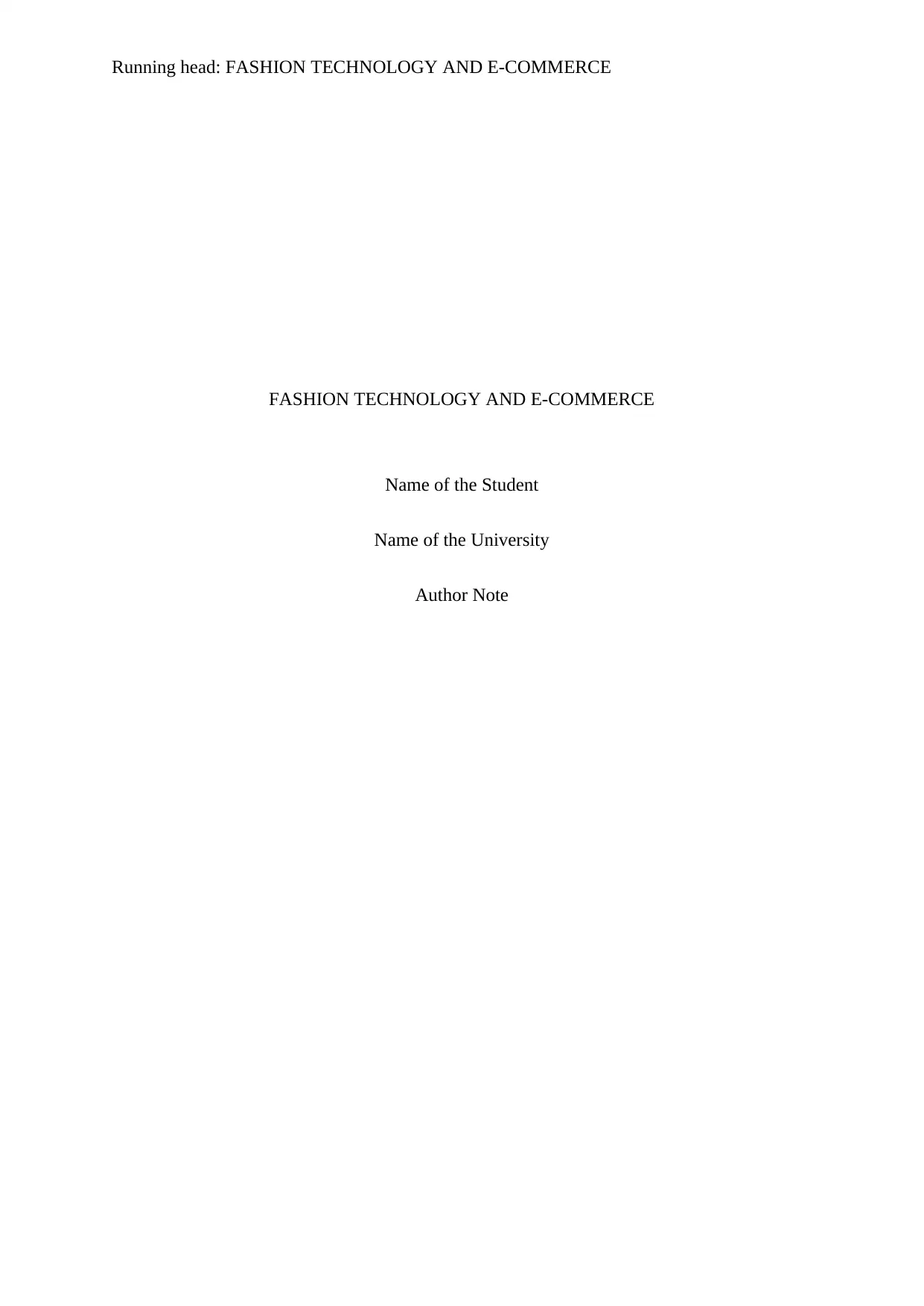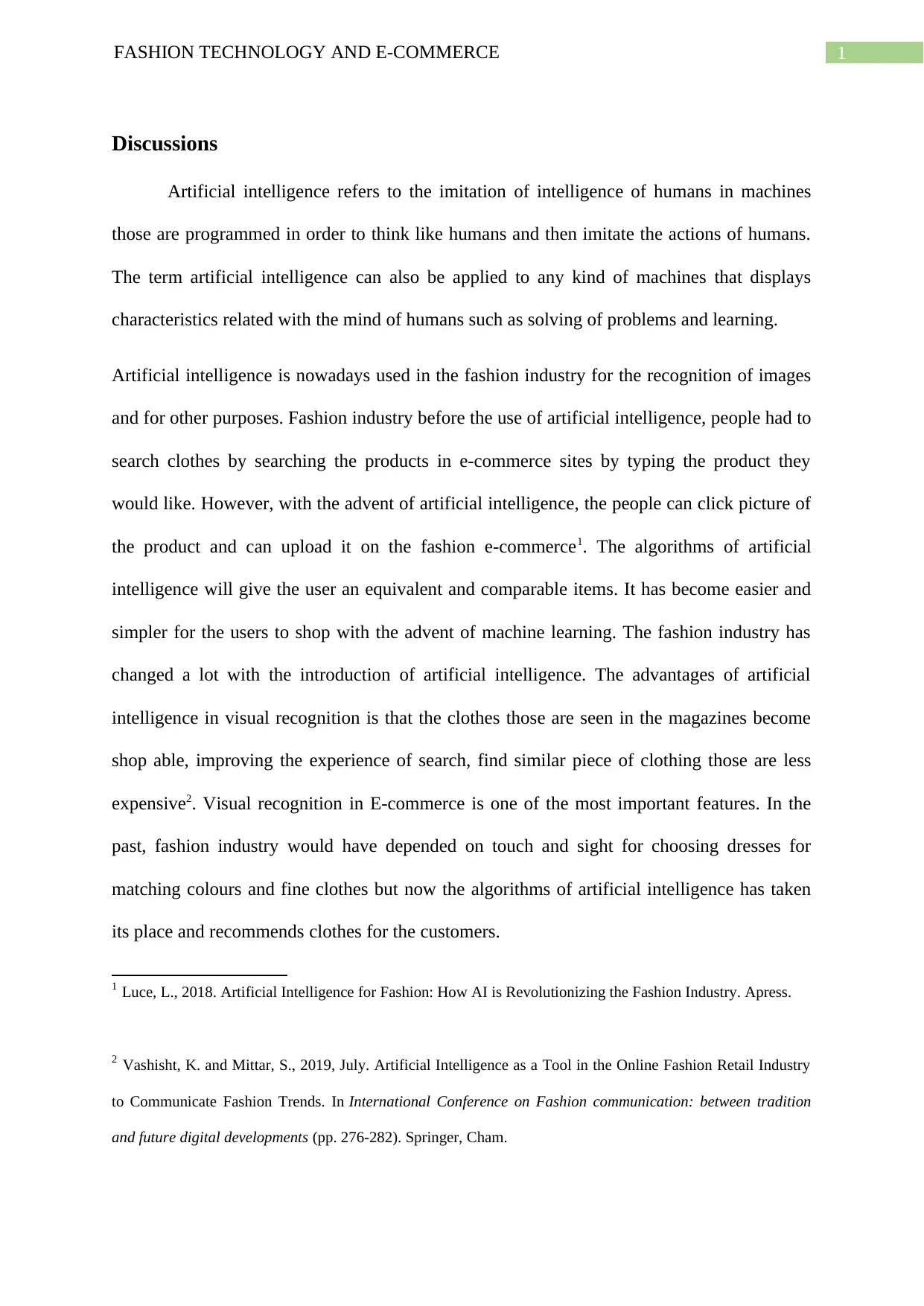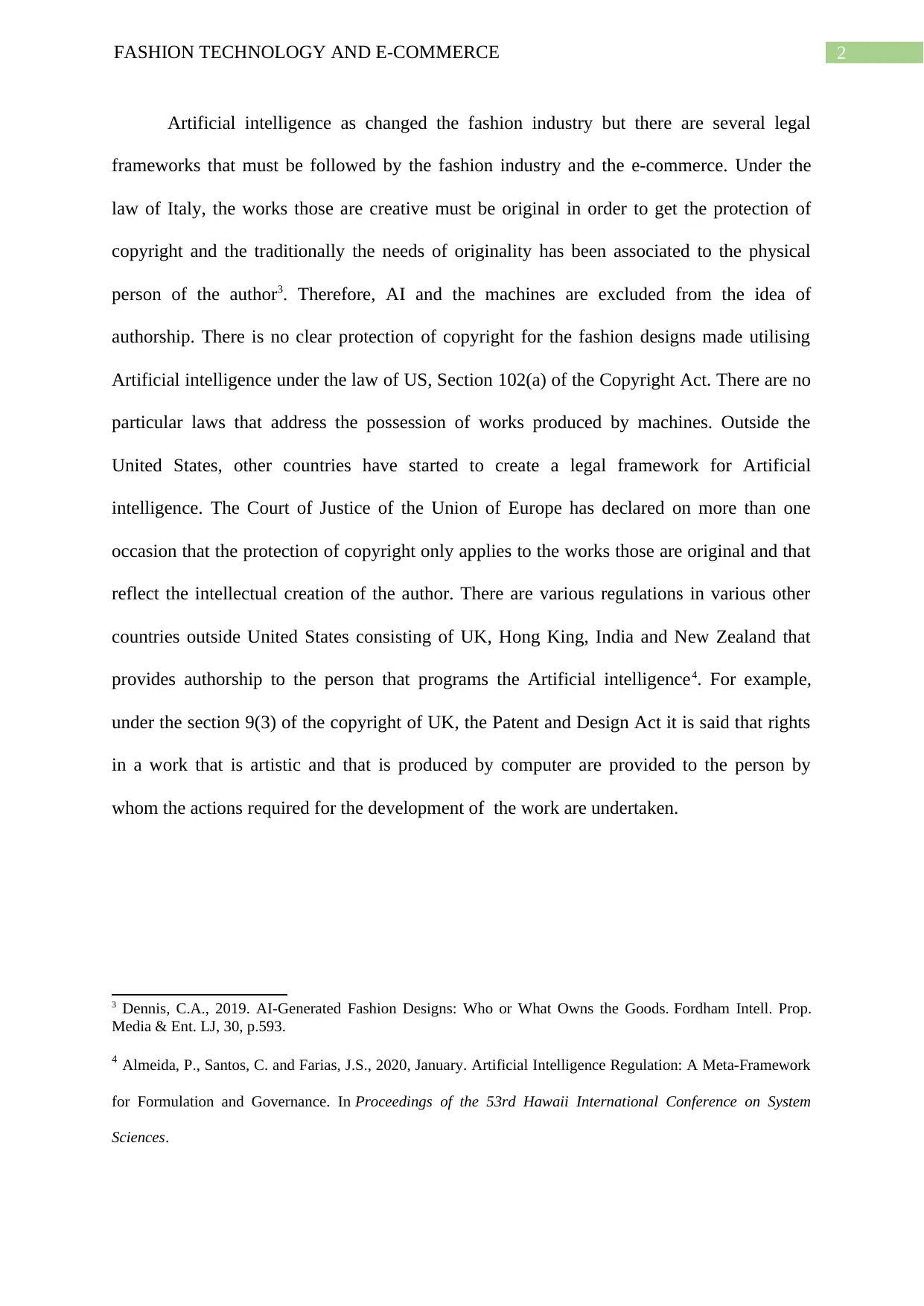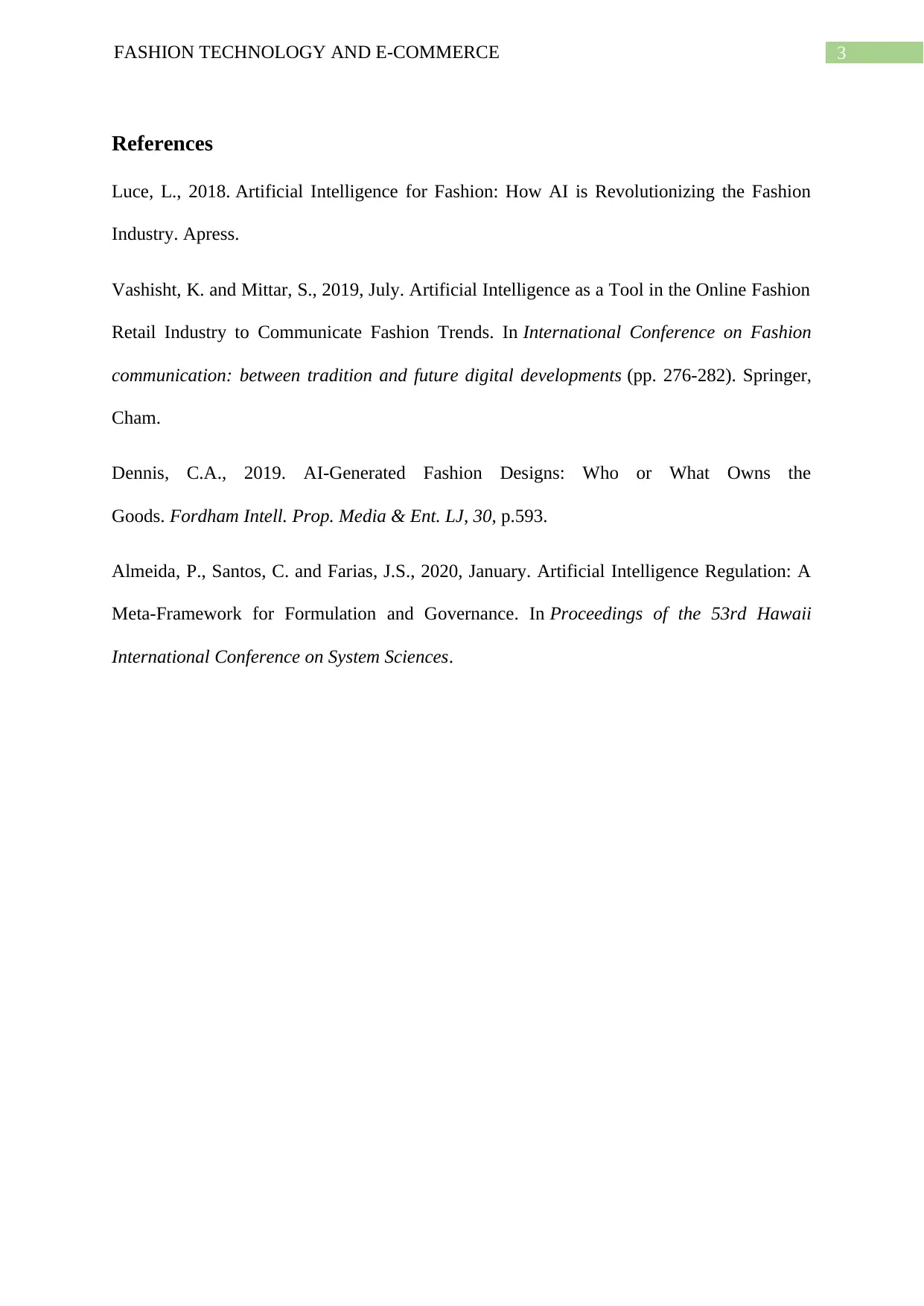Artificial Intelligence as a Tool in the Online Fashion Retail Industry
VerifiedAdded on 2022/09/05
|4
|714
|21
AI Summary
Contribute Materials
Your contribution can guide someone’s learning journey. Share your
documents today.

Running head: FASHION TECHNOLOGY AND E-COMMERCE
FASHION TECHNOLOGY AND E-COMMERCE
Name of the Student
Name of the University
Author Note
FASHION TECHNOLOGY AND E-COMMERCE
Name of the Student
Name of the University
Author Note
Secure Best Marks with AI Grader
Need help grading? Try our AI Grader for instant feedback on your assignments.

1FASHION TECHNOLOGY AND E-COMMERCE
Discussions
Artificial intelligence refers to the imitation of intelligence of humans in machines
those are programmed in order to think like humans and then imitate the actions of humans.
The term artificial intelligence can also be applied to any kind of machines that displays
characteristics related with the mind of humans such as solving of problems and learning.
Artificial intelligence is nowadays used in the fashion industry for the recognition of images
and for other purposes. Fashion industry before the use of artificial intelligence, people had to
search clothes by searching the products in e-commerce sites by typing the product they
would like. However, with the advent of artificial intelligence, the people can click picture of
the product and can upload it on the fashion e-commerce1. The algorithms of artificial
intelligence will give the user an equivalent and comparable items. It has become easier and
simpler for the users to shop with the advent of machine learning. The fashion industry has
changed a lot with the introduction of artificial intelligence. The advantages of artificial
intelligence in visual recognition is that the clothes those are seen in the magazines become
shop able, improving the experience of search, find similar piece of clothing those are less
expensive2. Visual recognition in E-commerce is one of the most important features. In the
past, fashion industry would have depended on touch and sight for choosing dresses for
matching colours and fine clothes but now the algorithms of artificial intelligence has taken
its place and recommends clothes for the customers.
1 Luce, L., 2018. Artificial Intelligence for Fashion: How AI is Revolutionizing the Fashion Industry. Apress.
2 Vashisht, K. and Mittar, S., 2019, July. Artificial Intelligence as a Tool in the Online Fashion Retail Industry
to Communicate Fashion Trends. In International Conference on Fashion communication: between tradition
and future digital developments (pp. 276-282). Springer, Cham.
Discussions
Artificial intelligence refers to the imitation of intelligence of humans in machines
those are programmed in order to think like humans and then imitate the actions of humans.
The term artificial intelligence can also be applied to any kind of machines that displays
characteristics related with the mind of humans such as solving of problems and learning.
Artificial intelligence is nowadays used in the fashion industry for the recognition of images
and for other purposes. Fashion industry before the use of artificial intelligence, people had to
search clothes by searching the products in e-commerce sites by typing the product they
would like. However, with the advent of artificial intelligence, the people can click picture of
the product and can upload it on the fashion e-commerce1. The algorithms of artificial
intelligence will give the user an equivalent and comparable items. It has become easier and
simpler for the users to shop with the advent of machine learning. The fashion industry has
changed a lot with the introduction of artificial intelligence. The advantages of artificial
intelligence in visual recognition is that the clothes those are seen in the magazines become
shop able, improving the experience of search, find similar piece of clothing those are less
expensive2. Visual recognition in E-commerce is one of the most important features. In the
past, fashion industry would have depended on touch and sight for choosing dresses for
matching colours and fine clothes but now the algorithms of artificial intelligence has taken
its place and recommends clothes for the customers.
1 Luce, L., 2018. Artificial Intelligence for Fashion: How AI is Revolutionizing the Fashion Industry. Apress.
2 Vashisht, K. and Mittar, S., 2019, July. Artificial Intelligence as a Tool in the Online Fashion Retail Industry
to Communicate Fashion Trends. In International Conference on Fashion communication: between tradition
and future digital developments (pp. 276-282). Springer, Cham.

2FASHION TECHNOLOGY AND E-COMMERCE
Artificial intelligence as changed the fashion industry but there are several legal
frameworks that must be followed by the fashion industry and the e-commerce. Under the
law of Italy, the works those are creative must be original in order to get the protection of
copyright and the traditionally the needs of originality has been associated to the physical
person of the author3. Therefore, AI and the machines are excluded from the idea of
authorship. There is no clear protection of copyright for the fashion designs made utilising
Artificial intelligence under the law of US, Section 102(a) of the Copyright Act. There are no
particular laws that address the possession of works produced by machines. Outside the
United States, other countries have started to create a legal framework for Artificial
intelligence. The Court of Justice of the Union of Europe has declared on more than one
occasion that the protection of copyright only applies to the works those are original and that
reflect the intellectual creation of the author. There are various regulations in various other
countries outside United States consisting of UK, Hong King, India and New Zealand that
provides authorship to the person that programs the Artificial intelligence4. For example,
under the section 9(3) of the copyright of UK, the Patent and Design Act it is said that rights
in a work that is artistic and that is produced by computer are provided to the person by
whom the actions required for the development of the work are undertaken.
3 Dennis, C.A., 2019. AI-Generated Fashion Designs: Who or What Owns the Goods. Fordham Intell. Prop.
Media & Ent. LJ, 30, p.593.
4 Almeida, P., Santos, C. and Farias, J.S., 2020, January. Artificial Intelligence Regulation: A Meta-Framework
for Formulation and Governance. In Proceedings of the 53rd Hawaii International Conference on System
Sciences.
Artificial intelligence as changed the fashion industry but there are several legal
frameworks that must be followed by the fashion industry and the e-commerce. Under the
law of Italy, the works those are creative must be original in order to get the protection of
copyright and the traditionally the needs of originality has been associated to the physical
person of the author3. Therefore, AI and the machines are excluded from the idea of
authorship. There is no clear protection of copyright for the fashion designs made utilising
Artificial intelligence under the law of US, Section 102(a) of the Copyright Act. There are no
particular laws that address the possession of works produced by machines. Outside the
United States, other countries have started to create a legal framework for Artificial
intelligence. The Court of Justice of the Union of Europe has declared on more than one
occasion that the protection of copyright only applies to the works those are original and that
reflect the intellectual creation of the author. There are various regulations in various other
countries outside United States consisting of UK, Hong King, India and New Zealand that
provides authorship to the person that programs the Artificial intelligence4. For example,
under the section 9(3) of the copyright of UK, the Patent and Design Act it is said that rights
in a work that is artistic and that is produced by computer are provided to the person by
whom the actions required for the development of the work are undertaken.
3 Dennis, C.A., 2019. AI-Generated Fashion Designs: Who or What Owns the Goods. Fordham Intell. Prop.
Media & Ent. LJ, 30, p.593.
4 Almeida, P., Santos, C. and Farias, J.S., 2020, January. Artificial Intelligence Regulation: A Meta-Framework
for Formulation and Governance. In Proceedings of the 53rd Hawaii International Conference on System
Sciences.

3FASHION TECHNOLOGY AND E-COMMERCE
References
Luce, L., 2018. Artificial Intelligence for Fashion: How AI is Revolutionizing the Fashion
Industry. Apress.
Vashisht, K. and Mittar, S., 2019, July. Artificial Intelligence as a Tool in the Online Fashion
Retail Industry to Communicate Fashion Trends. In International Conference on Fashion
communication: between tradition and future digital developments (pp. 276-282). Springer,
Cham.
Dennis, C.A., 2019. AI-Generated Fashion Designs: Who or What Owns the
Goods. Fordham Intell. Prop. Media & Ent. LJ, 30, p.593.
Almeida, P., Santos, C. and Farias, J.S., 2020, January. Artificial Intelligence Regulation: A
Meta-Framework for Formulation and Governance. In Proceedings of the 53rd Hawaii
International Conference on System Sciences.
References
Luce, L., 2018. Artificial Intelligence for Fashion: How AI is Revolutionizing the Fashion
Industry. Apress.
Vashisht, K. and Mittar, S., 2019, July. Artificial Intelligence as a Tool in the Online Fashion
Retail Industry to Communicate Fashion Trends. In International Conference on Fashion
communication: between tradition and future digital developments (pp. 276-282). Springer,
Cham.
Dennis, C.A., 2019. AI-Generated Fashion Designs: Who or What Owns the
Goods. Fordham Intell. Prop. Media & Ent. LJ, 30, p.593.
Almeida, P., Santos, C. and Farias, J.S., 2020, January. Artificial Intelligence Regulation: A
Meta-Framework for Formulation and Governance. In Proceedings of the 53rd Hawaii
International Conference on System Sciences.
1 out of 4
![[object Object]](/_next/static/media/star-bottom.7253800d.svg)


